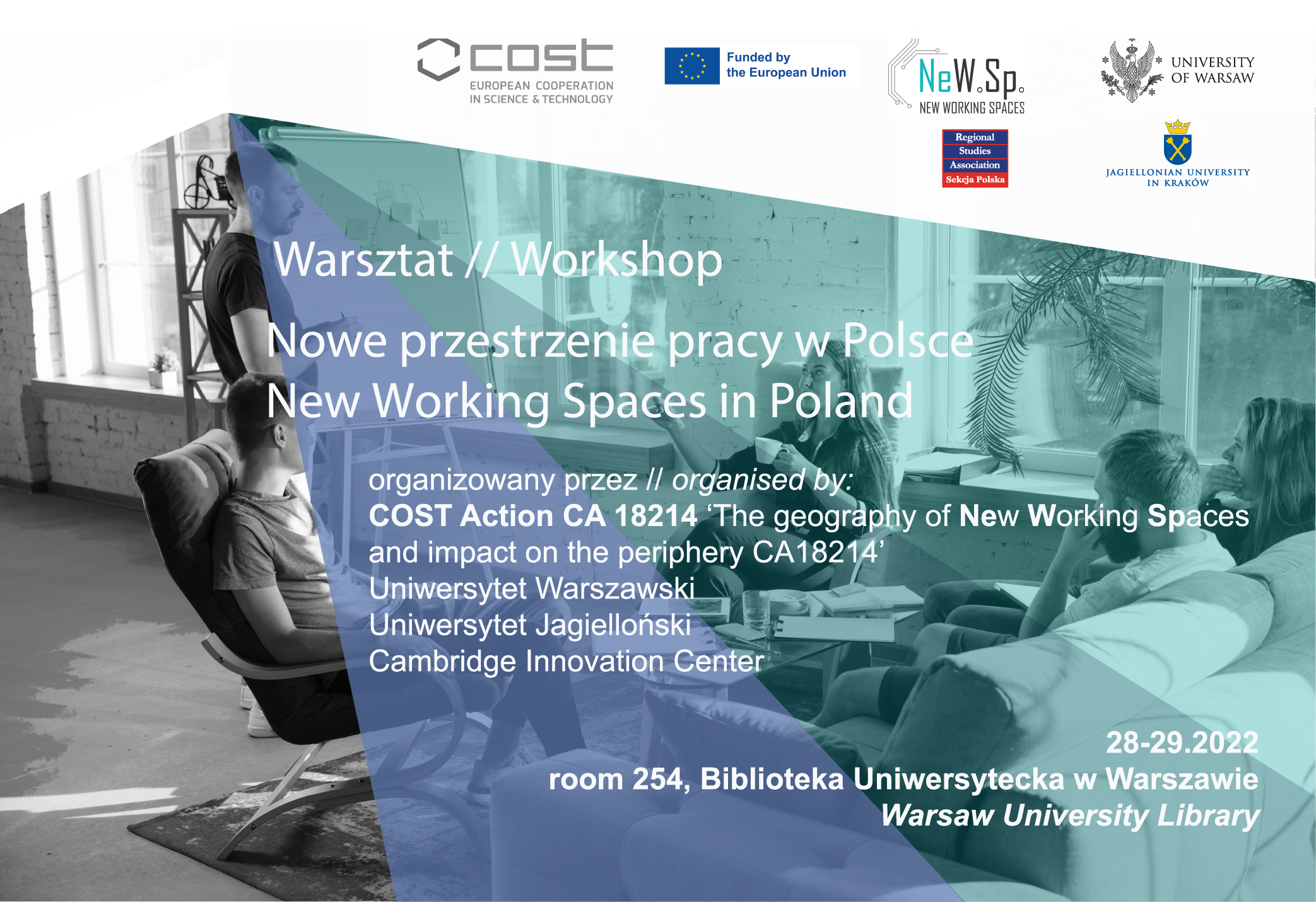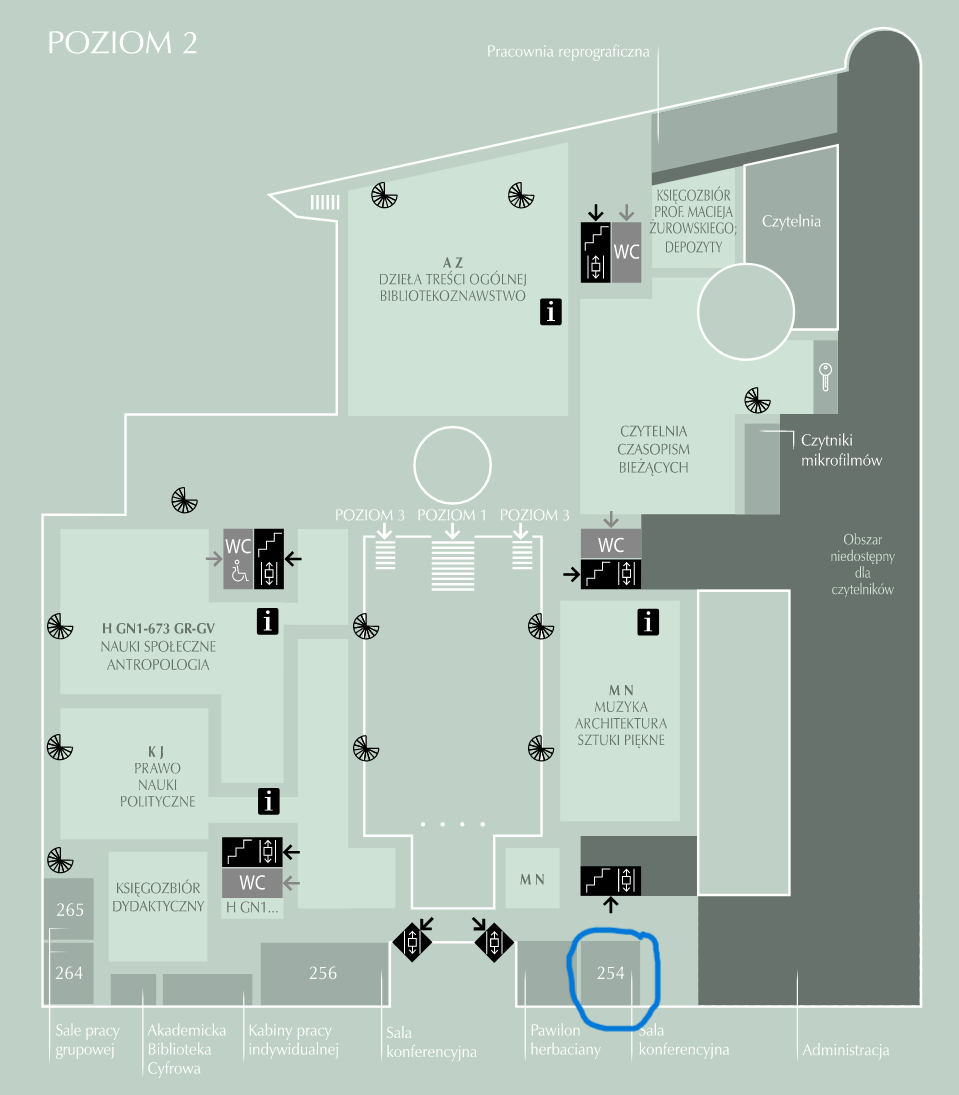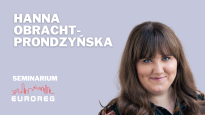Workshop: New Working Spaces in Poland

PLACE and DATE: 28th-29th September 2022, Warsaw University Library, room 254, 2nd floor (just by the right lift), University of Warsaw, Poland

The event will be organized in a hybrid mode (in person and online) in English.
Link: https://uw-edu-pl.zoom.us/my/new.work.spaces
28th September 11.00-17.00
11:00 – 11:30 INTRODUCTION
Introduction to COST Action CA 18214 ‘The geography of New Working Spaces and impact on the periphery CA18214’ situation in Central and Eastern Europe - RNDr. Pavel Bednář, Ph.D. (Tomas Bata University)
11:30-13:00 KEY LECTURES
Overview of research of New Working Spaces in Poland from an international perspective – main patterns and causalities - prof. dr hab. Grzegorz Micek & Karolina Małochleb (Jagiellonian University)
Transformation of the geography of New Working Spaces in Warsaw - prof. dr hab. Maciej Smętkowski & dr Katarzyna Wojnar (University of Warsaw)
Flexible Office Spaces and the New Landscape of Work - Jakub Jóźwicki (Cambridge Innovation Center)
Transformation of co-working spaces from the insider perspective - Piotr Boulangé (Cowork & Startups)
Impact of the Russian invasion on co-working sector in Ukraine - Vika Żurbas (Coworking Association Ukraine)
13:00-14:00 LUNCH
14:00-16:00 INTERACTIVE WORKSHOP ASSISTED BY MIRO
- Hub-Club co-work model and the center-periphery issue (WG1)
- Impact of the pandemic and war in Ukraine on co-working spaces in Poland (WG2)
- New Working Spaces – opportunities and challenges for metropolitan planning (WG3)
16:00 – 16:15 COFFEE BREAK
16:15-17:00 SUMMARY
18:00 - DINNER
Paloma nad Wisłą Bistro
Wybrzeże Kościuszkowskie 47, 00-390 Warszawa
29th September: 10.00 – 12.00 STUDY TOUR
Study tour to selected new working spaces in Warsaw CBD.
Meeting Point: Cambridge Innovation Center, Chmielna 73, Warsaw
OBJECTIVES:
The traditional model of the economy and the city has historically been based on work provided in a specific location and the rigidity and disconnectedness of home-work relationships. Only information and communication technologies have led to a fundamental change in the work environment, including the possibility of decoupling the provision of work from a specific location. Despite the increase in flexibility of workplace choices, the need for social interaction appears to be essential for the generation of new ideas, innovation, and the satisfaction of workers' social needs. This provides the basis for the emergence of a new model of workspace organization in the form of co-working, where workspace is shared on a flexible basis.
This phenomenon is particularly visible in metropolises that are key centers of the global information economy. The ways in which co-working spaces operate are based on diversified models which include the original grassroots initiatives based on common values and community spirit as well as top-down generic initiatives based on corporate business model. However, the COVID pandemic has made significant changes to this picture as well as the recent war in Ukraine.
The aim of the Workshop is to assess the impact of the emergence of co-working spaces and the evolution of their model on the transformation of metropolitan spaces occurring in pandemic and post-pandemic realities with particular focus on Central and Eastern European Macroregion and Poland.
The event is organized by the COST members in Poland who are involved in COST Action CA18214 'The Geography of New Working Spaces and Impact on the Periphery' (2019-2023), funded by the European Union http://www.new-working-spaces.eu/
The event is organized in collaboration with Cambridge Innovation Center.
This workshop will be of interest to researchers, policy makers and practitioners in the field of:
- Urban planning
- Real-estate analysis
- Economic geography
- Social science
- Policy and decision making
The workshop is supported by COST Action CA18214 ‘The geography of New Working Spaces and the impact on the periphery’, supported by COST (European Cooperation in Science and Technology) www.cost.eu and http://www.new-working-spaces.
COST (European Cooperation in Science and Technology) is a funding agency for research and innovation networks. Our Actions help connect research initiatives across Europe and enable scientists to grow their ideas by sharing them with their peers. This boosts their research, career and innovation.




